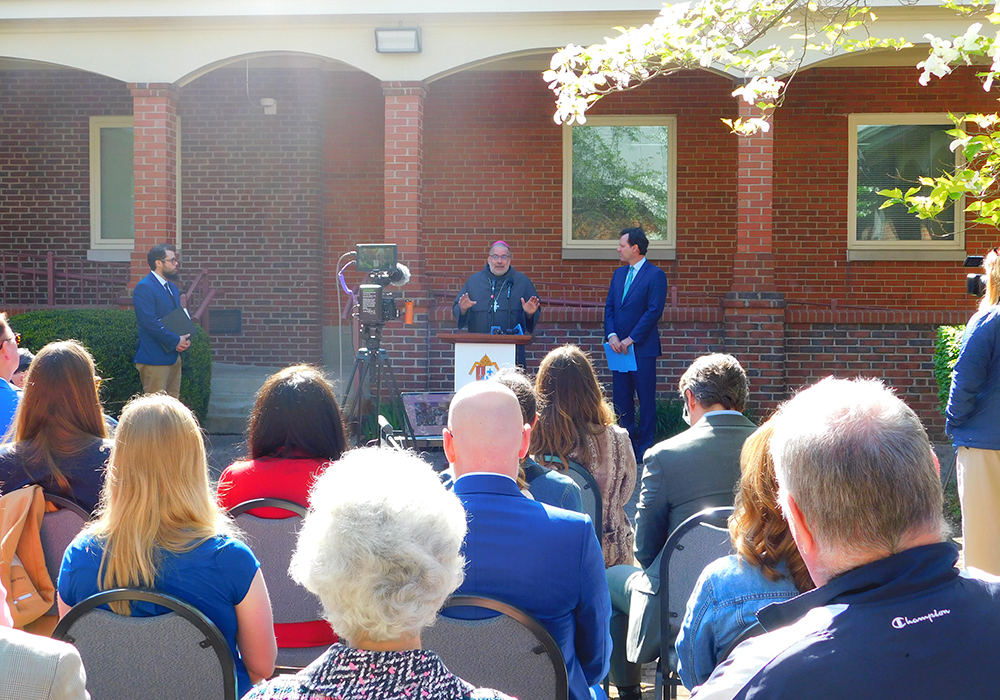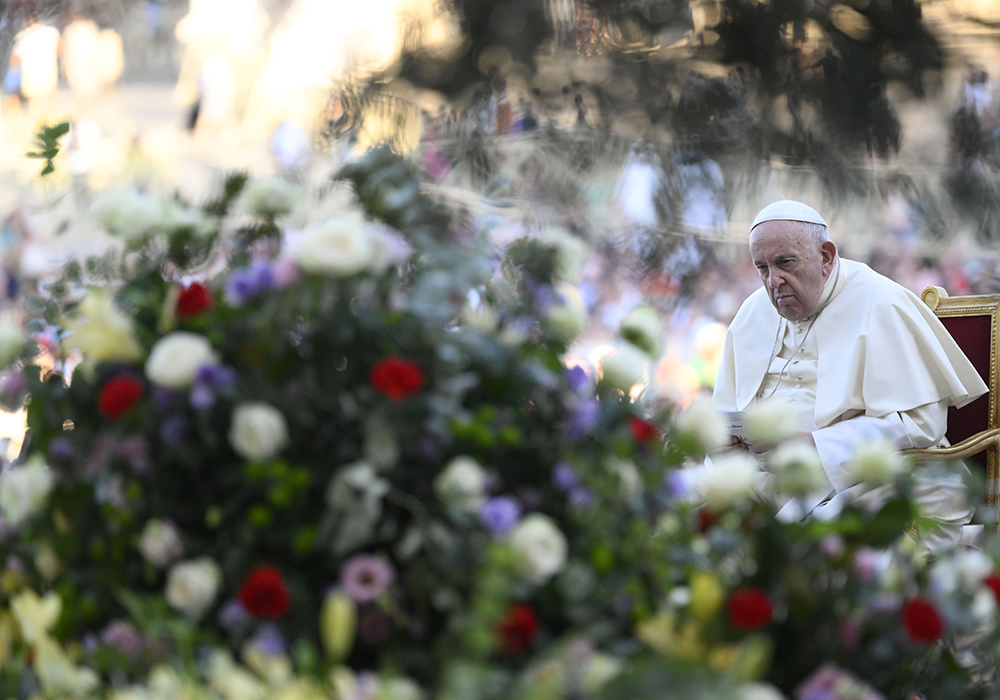
Bishop John Stowe of the Diocese of Lexington, Kentucky, at a press conference April 23 announces a net-zero initiative to make the diocese one of the first in the U.S. to adopt such a commitment. At right is Adam Edelen, founder and CEO of Edelen Renewables. At left is Joshua van Cleef, director of the diocese's peace and justice office. (Courtesy of Diocese of Lexington)
BY NCR EDITORIAL STAFF
View Author Profile
Join the Conversation
Send your thoughts to Letters to the Editor. Learn more
April 30, 2024
Nine years after the publication of Pope Francis' encyclical "Laudato Si', on Care for Our Common Home," four years following the announcement of the Vatican-led Laudato Si' Action Platform and six months since the release of Francis' apostolic exhortation "on the climate crisis," Laudate Deum, Catholics in the United States are beginning to see the type of clear, tangible and decisive climate action for which the pope has called.
Catholics in the U.S. are also starting to see glimpses of the type of leadership and community promoted by the global synod process that Francis has identified as the way forward for the church today.
The latest encouraging news came from the Diocese of Lexington, in the middle of Kentucky coal country, when on April 23 Bishop John Stowe announced his diocese has committed to achieving net-zero emissions by 2030. As reported for EarthBeat by NCR environment correspondent Brian Roewe, they've assembled an 11-member task force of diocesan officials and business leaders of major industries in the area, including Toyota and Lexmark.
It's a bold goal from an unlikely region of the country, but the apparent enthusiasm surrounding the initiative goes to show what might be possible when leadership prioritizes climate issues and engages the community in pursuing solutions together. Some might even call it an exercise in synodality, an organizational process that rests on the type of mutual listening and collaboration many people weren't sure the U.S. church hierarchy was capable of practicing. And yet, it's precisely the approach demanded by an integral ecology that recognizes the connectedness of all creation and every facet of a community with a focus on the common good.
Stowe has long been a champion of such themes of the Francis papacy and here again strives to show others how it can be done. He said during the April 23 press conference, "On this day we take this important step forward because our Holy Father, Pope Francis, has invited us to take seriously the encyclical, the teaching, that he gave us back in 2015. … Pope Francis has picked up on [the teachings of] Francis of Assisi as an example of how humanity needs to work together to cross over all kinds of lines of separation and division, culture and every other way that we find to separate ourselves, and work together to preserve, protect and allow to flourish our common home."

Pope Francis listens during an ecumenical prayer vigil before the assembly of the Synod of Bishops in St. Peter's Square at the Vatican Sept. 30, 2023. (CNS/Vatican Media)
Stowe also called attention to the urgency of the issue, and the thus far large lack of attention from the U.S. church, noting that the pope's tone in 2023's Laudate Deum "was almost scolding in nature because not much has happened since 2015. … He says we're losing time. We have to begin to act."
Of the Lexington Diocese's decision to pursue a net-zero future, he added, "We're grateful to say we're gonna do this, and reduce our carbon consumption, our carbon footprint, and bring ourselves to net-zero, in a pretty short amount of time, because we only have a pretty short amount of time to make an impact in a lasting way on this world."
Adam Edelen, CEO and founder of Lexington-based Edelen Renewables, who will be partnering with the diocese on the net-zero initiative, said, "I think the real soul-building stuff here is that we can provide a roadmap for others who want to do the same thing."
And despite reports earlier this year that even some U.S. bishops themselves feel the U.S. church is failing on the pope's climate goals (an opinion NCR has also often expressed within our editorial pages), it does seem that at least some diocesan leadership is ready to rise to the challenge and might be interested in that roadmap.
In January, the Archdiocese of Chicago, led by Cardinal Blase Cupich, began to power its parishes and schools with 100% renewable energy and the Diocese of San Diego, led by Cardinal Robert McElroy, was the first diocese in the U.S. to divest from fossil fuels.
These are measurable, long-term and large-scale systemic changes to how Catholic dioceses operate in the United States that reflect a holistic approach to creation care beyond the ministry office. These initiatives require cooperation with the offices of facilities, finance, maintenance, human resources and more. They require input from experts in sectors outside religion, including energy, economics, sustainability, labor and business.
"It's one thing to talk about doing something. It's another thing to put something out there that you can be held accountable to and have measured for you," said Stowe of the Diocese of Lexington's net-zero plans.
And while the first U.S. diocese to commit to net-zero emissions is incredibly important news, it's that invitation for accountability and the implementation of a structure to follow through with it that may signify an even more important shift for the church in the U.S. today.
No comments:
Post a Comment